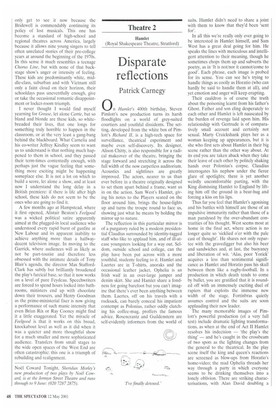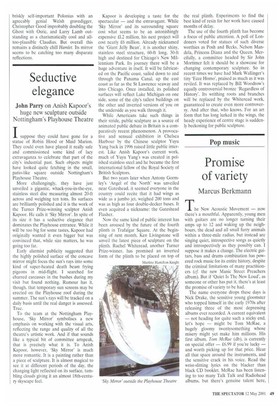Disparate reflections
Patrick Carnegy On Hamlet's 400th birthday, Steven Pimlott's new production turns its harsh floodlights on a world of grey-suited courtiers and youthful dissidents. The setting, developed from the white box of Pimlott's Richard II, is a high-tech space for surveillance, theatrical experiment and maybe even self-discovery. Its designer, Alison Chitty, is also responsible for a radical makeover of the theatre, bringing the stage forward and stretching it across the full width of the now carpetless auditorium. Acoustics and sightlines are greatly improved. The actors, nearer to us than ever before in a theatre originally designed to set them apart behind a frame, want us in on the action. Sam West's Hamlet, giving his notes to the Players seated on the floor around him, brings the house-lights up and turns the troupe round to face us, showing just what he means by holding the mirror up to nature.
The reflection in this particular mirror is of a purgatory ruled by a modern presidential Claudius surrounded by identity-tagged staff who like to applaud him, and of ill-atease youngsters looking for a way out. Seldom, outside school and college, can the play have been put across with a more youthful, studenty feeling to it. Hamlet and Laertes are in T-shirts, anoraks and the occasional leather jacket, Ophelia is an Irish waif in an over-large jumper and denim skirt. She and Hamlet share a fondness for going barefoot but you can't imagine that there's ever been anything between them. Laertes, off on his travels with a rucksack, can barely conceal his impatient contempt as Polonius, rather oddly clutching his coffee-mug, proffers the famous advice. Rosencrantz and Guildenstern are self-evidently informers from the world of suits. Hamlet didn't need to share a joint with them to know that they'd been 'sent for'.
In all this we're really only ever going to be interested in Hamlet himself, and Sam West has a great deal going for him. He speaks the lines with meticulous and intelligent attention to their meaning, though he sometimes chops them up and subverts the poetry, as in 'It is not/nor it cannot/come to good'. Each phrase, each image is probed for its sense. You can see he's trying to handle things as coolly as Horatio (who can hardly be said to handle them at all), and yet emotion and anger will keep erupting.
Their cauldron is of course the truth about the poisoning learnt from his father's Ghost. Father and son cling desperately to each other and Hamlet is left nauseated by the burden of revenge laid upon him. His relationship with Gertrude is of comparatively small account and certainly not sexual. Marty Cruickshank plays her as a woman keeping up appearances, but it is she who first sets about Hamlet in their big scene rather than the other way about. At its end you are taken aback when they take their leave of each other by politely shaking hands over Polonius's corpse. Claudius interrogates his nephew under the fierce glare of spotlights; there is yet another weirdly uncomfortable parting, with the King dismissing Hamlet to England by lifting him off the ground in a bear-hug and forcing a kiss on his lips.
Thus far you feel that Hamlet's agonising and his battles with himself are those of an impulsive immaturity rather than those of a man paralysed by the over-abundant contrarities of his thought. West seems most at home in the final act, where action is no longer quite so `sicklied o'er with the pale cast of thought'. He shares not only repartee with the gravedigger but also his beer and sandwiches and, at last, the buoyancy and liberation of wit. 'Alas, poor Yorick' acquires a less than sentimental significance as Hamlet and Horatio pass his skull between them like a rugby-football. In a production in which death tends to come by bullet, you are gratified that it is rounded off with an immensely exciting duel of rapiers that exploits the immense new width of the stage. Fortinbras quietly assumes control and the suits are soon applauding their new leader.
The many memorable images of Pimlott's powerful production (of a very full text) include dramatic lighting transformations, as when at the end of Act II Hamlet resolves his indecision — 'the play's the thing' — and he's caught in the crossbeam of two spots as the lighting changes from the general to the theatrical. In the play scene itself the king and queen's reactions are screened as blow-ups from Horatio's home-video; the mad Ophelia threads her way through a party in which everyone seems to be drinking themselves into a lonely oblivion. There are striking characterisations, with Alan David doubling a
briskly self-important Polonius with an agreeably genial Welsh gravedigger, Christopher Good improbably doubling the Ghost with Osric, and Larry Lamb outstanding as a charismatically cool and alltoo-plausible Claudius. But overall this remains a distinctly chill Hamlet. Its mirror seems to be catching too many disparate reflections.



































































 Previous page
Previous page